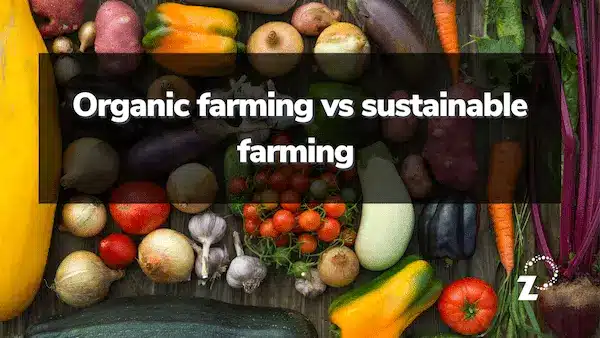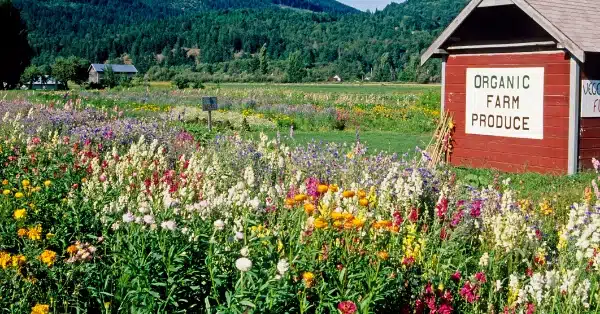The words ‘organic farming’ and ‘sustainable agriculture’ are often used interchangeably. However, while these terms are closely connected, they do refer to two distinct concepts. In this blog post, we’ll explain the difference between the two, as well as provide clarity on a couple of other questions, such as: is organic farming sustainable?
Summary: Organic farming vs sustainable farming
Organic farming isn’t the same as sustainable farming, Both types of agriculture have different goals and definitions. Although organic farming can be sustainable, this isn’t always the case. Read on to learn more about the differences and relationships between the two.
What’s in this blog:
Firstly, what is sustainable farming?
How sustainable farming works
What is organic farming?
Is organic farming sustainable?
Examples of organic vs. sustainable farming in action
Shifting SA’s agricultural sector toward sustainability
Adopting sustainable farming methods
The role of soil health in sustainable farming
A new farming future
Firstly, what is sustainable farming?
Sustainable farming is the name for a loose set of agricultural practices that work together to:
- Limit the use of potentially harmful chemicals
- Employ biological and natural controls for pests and disease
- Conserve soil fertility
- Respect animal life
- Use non-renewable resources efficiently
- Enhance environmental quality and natural resources
- Enhance the quality of life of farming communities and society at large.
- Satisfy human food and clothing needs
- Take better advantage of on-farm resources
- Sustain the economic viability of farming
In essence, the goal of sustainable farming is to work with natural processes rather than against them.
How sustainable farming works
As the earth’s resources dwindle and its population increases, we need to find a balance between feeding the planet and securing food for future generations. This is where sustainable farming comes in.
Sustainable farming is nothing new; its methods have been practised for millennia. One could even say that sustainable farming was the ‘original’ agriculture before the proliferation of ‘factory’ farming. Nowadays, however, sustainable farming practices are being modernised, refined and adapted to work at scale.
Sustainable farming uses natural processes to address issues such as:
- Water management
- Crop management
- Soil fertility
- Energy management
- Waste management
- Disease/pest management
Sustainable farming vs conventional farming practices examples
| Conventional farming | Sustainable farming |
| Boosts soil fertility with chemical fertilisers. | Uses manure from on-farm animals. |
| Inoculates cows against bacterial infections with regular shots of antibiotics. | Allows the cows to graze in more sanitary conditions, avoiding infections altogether and encourages plants and animals to use their natural resistance rather than chemical solutions. |
| Employs monoculture that requires more and more chemical fertilisers to replenish lost nutrients. | Employs a broad crop diversity and careful rotation so that nutrients are replenished naturally. |
| Uses chemical pesticides. | Plants disease-resistant varieties of crops or uses companion plants to attract insects that ward off invasive pests. |
What is organic farming?
In organic farming, no chemical fertiliser and pesticides or herbicides are allowed. Instead, organic farmers use ecologically-based pest controls and biological fertilisers derived largely from animal and plant wastes—a practice that is also encouraged when adopting a sustainable farming approach.
Learn more about organic farming here.
Is organic farming sustainable?
Here’s the tricky bit: organic farming can generally be classified as contributing to sustainable agriculture, as most organic farms also follow sustainable practices. Yet organic products can also be produced on farms that are not sustainable, and sustainable farming need not be 100% organic. Making matters even more complicated, a farm could be following (or exceeding) organic standards, but isn’t recognised as such as the farmer doesn’t want to pay the expense of getting certified.
One way of thinking of the difference between organic farming and sustainable agriculture is:
- Organic farming involves a precise set of criteria when it comes to growing and raising produce. In South Africa, you need to have been producing according to these criteria for between 24 and 36 months (depending on the crop) before you can receive organic certification.
- Sustainable agriculture is more of a philosophy and way of life that involves not only the produce itself, but the natural, social and economic farming environments as a whole
The key distinguishing feature of sustainable agriculture is that it’s a way of feeding the world (now and into the future) without damaging the environment or threatening human health. Certified organic farming, on the other hand, may not produce food using methods that will sustain the farm’s yields and productivity for generations to come.
Key features of sustainable farming include:
- Ecological and ethically responsible
- Practices can lead to higher yields over time
- Less need for expensive and environmentally damaging inputs
- No official certification required
Examples of organic vs. sustainable farming in action
| Organic | Sustainable | |
| Animal welfare | Farmers can confine animals and still gain organic certification. | Animals must be permitted to carry out their natural behaviours (such as rooting, pecking or grazing). |
| Antibiotics | No antibiotics can be fed to organic-certified livestock. | Antibiotic use in sustainable farming is restricted – they can be used, as long as they have run out of the animal’s system before selling its meat or milk. |
| Artificial hormones | No added or artificial hormones. | No added or artificial hormones. |
| Food travel | Does not take into consideration the use of fossil fuels used to transport food. | Distributed and sold as close to the farm as possible. |
| Chemical inputs | Avoids the use of chemical fertilisers, pesticides, herbicides, additives etc. | Sustainable farming uses inputs appropriately depending on need and overall sustainability. |
| Organic inputs | Organic manure, mulching, green manure, botanical extracts etc. | Organic manure, mulching, green manure, botanical extracts etc. – if these inputs benefit sustainability. |
| Evaluation | Set of standard commercial farming rules. | Based on soil health, water efficiency, energy efficiency, labour conditions, biodiversity etc. |
Essentially, sustainable farming involves a more holistic outlook than organic farming, with a focus on addressing global sustainability goals.
Shifting SA’s agricultural sector toward sustainability
Writing in his personal capacity for the Daily Maverick, Professor Raymond Auerbach (a member of the boards of the SA Organic Sector Organisation and the Agricultural Research Council) says that cuts to South Africa’s agriculture budget will put our food security at even further risk. He suggests that South Africa needs to direct more funding to agricultural research that serves the public good, rather than just boosting agribusiness profits.
Finance Minister Tito Mboweni’s COVID-19 budget was criticised for only helping farmers who farm with chemical inputs, since assistance can only be used to buy synthetic fertiliser and poisons. Strategies such as this are based on a short-term handout mentality; they do not equip farmers to farm more sustainably, or even more profitably.
In 2016, South Africa’s Agricultural Research Council (ARC) published an analysis of the difficulties facing our food systems, summarised as follows:
- Increasing population
- Climate change impacts
- Urbanisation
- Deterioration in soil, plant and animal health
- Energy supply
- Water availability and quality
- Pest and disease outbreaks
- Reduced biodiversity
- Increases in input and commodity prices
What can be done to address food system challenges?
At a policy-making level, we need to adopt strategies to deal with the issues mentioned above; policies which create:
- An enabling agricultural environment
- Security of land tenure
- Political and economic stability
In addition, the South African agricultural sector must remain competitive and productive. This can be achieved through:
- Modern and alternative agricultural practices and systems
- The development of emerging farming and processing sectors
- Improving infrastructure and access to the value chain
- Skills development
- Technology transfer
The four key issues that agricultural policy must address
- Practical farmer training to equip young farmers with sustainable farming knowledge
- Laboratory services to provide farmers with low-cost soil and feed analyses
- Incentives should be linked to long-term sustainability indicators
- National agriculture should be evaluated in terms of progress towards sustainability.
Adopting sustainable farming methods
Funding for agricultural research needs to be broadened to allow a focus on improving the nutritional value of food and helping farmers to use sustainable approaches. We need soil and crop scientists to assist farmers in building soil fertility through a combination of:
- Soil biology – earthworms and microbes through compost
- Soil chemistry – natural inputs
- Soil physics – minimum tillage, soil cover and crop rotation
With soil as a starting point, this approach should combine soil health with pest and disease management, seed breeding, veld and pasture management and strategies to increase farm biodiversity.
The role of soil health in sustainable farming
One of the major applications of sustainable farming involves returning good health to the soil whilst simultaneously reducing input costs and reliance on inorganic fertilisers. Doing so can help South African farmers become more resilient in the face of the challenges they’re currently facing.
Think of a grassland in a nature reserve, for example: in the natural grassland environment, the soil is fed through the slow decomposition of organic matter such as dead plants, dead animals and droppings. It is also home to a wide diversity of plant life that has evolved natural resistance to common diseases and pests. This naturally-fertile soil is also rich in microbial life and insects that repel pests and help cycle nutrients back into the earth.
On a conventionally-run farm, this process is bypassed in favour of adding the recommended doses of nutrients such as nitrogen, phosphorus, potassium to the soil. It’s quick and it’s easy, but it’s a short-term solution. At regular intervals, the soil will need to be “replenished”, plied with more and more chemical substances which do not enrich it and whose costs increase substantially each year.
Sustainable farming practices, on the other hand, work hard to enrich the soil with each successive season. The net result of this type of agriculture is more nutrient-dense food, crops and livestock.
A new farming future
To achieve food and nutrition sustainability, South African agriculture policies will need to shift away from chemical subsidies to support mentorships, partnerships, increased biodiversity and a long-term approach to soil fertility and animal nutrition. This goes past the organic farming approach, taking the form of regenerative (and thus sustainable) farming.
At Zylem, our primary goal is to help farmers work towards these objectives by achieving improved soil health. Our biological foliar and soil conditioners support regenerative and sustainable agriculture, which is the foundation of farming for our future. Get in touch with one of our consultants to find out about our sustainable solutions.

About the Author: Alex Platt
Alex is Business Development Manager at Zylem. He’s inspired by the potential of regenerative farming and takes a special interest in the technology and products that are moving agriculture in a more sustainable direction.


